Rainy weather could not dampen the spirits of more than 300 students, staff, faculty, alumni and community members who attended the MSU Juneteenth Celebration. June 19, 1865, the day enslaved Black Americans were told they were free, is referred to as Juneteenth, and for decades has been observed by local communities as a holiday and reason to remember the history of slavery in the United States.
This year, Michigan State University, for the first time, participated in a week-long celebration of Juneteenth events that included virtual film screenings and culminated in one of the first post-pandemic in-person events on campus on June 19, 2021.
Chillier temps, high winds and, at times, hard rain, would not deter attendees who queued outside a large white event tent on Munn Field beginning at 11:30 a.m.
Debora Sudduth, administrative assistant in the College of Human Medicine who was in attendance noted, “MSU Juneteenth Celebration was a wonderful coming together of the community. The speakers’ messages were on point and people did not mind the rain.”
Whether the excitement was combined exuberance for the first community-wide celebration on campus or the day’s new designation as a federal holiday, the energy was palpable.
“The federal government’s recognition of Juneteenth is paramount as it acknowledges the lingering impact and overall injustice of a system that authorized acts of violence and inhumane treatment that continues to plague Black people in this nation,” said Vice President and Chief Diversity Officer Jabbar R. Bennett, Ph.D.
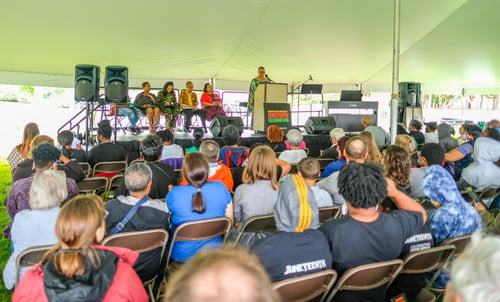
Tama Hamilton-Wray welcomes panel at Juneteenth Celebration. Photo by Derrick L. Turner.
After a tenuous year following the many revelations of disparities in the health care system and among essential workers, and ongoing police brutality, this year’s celebration sounded the alarm bell in a way that had not been heard previously. Juneteenth is the recognition of what continues to be the long road to freedom.
“From all accounts, the event was well-received by those who attended as it provided an opportunity to reflect on the history of slavery in our nation, the lasting impact on Black people in America and the work yet to be done to achieve a fuller semblance of liberation,” said Bennett.
MSU research associate Nakia Parker, who begins her assistant professorship in the Department of History this August, presented a brief history of Juneteenth, remarking that it was 100 years after 1865 that a national reckoning with what it means to be free occurred — and another 56 years later Black Americans continue to fight for freedom following the death of George Floyd. Parker said, “Black Americans are still trying to get closer to freedom.”
Other speakers included Board of Trustee member Rema Vassar, who, commenting on the narrative of Juneteenth, questioned, “Why does it have to be that we can’t emancipate ourselves? Somebody had to tell us that we are free.”Most counts of Juneteenth largely ignore the sacrifices made by enlisted African American soldiers to help win the Civil War.
Juneteenth is a reminder that, “We are in it [together], inextricably linked and bound,” said Vassar. All Americans and residents have a vested interest in freedom and if one group is oppressed then we all are.
Former two-term President of the Black Students’ Alliance, Sharron Reed-Davis, opened by saying, “We are stronger with our allies and that’s all of you today who do not identify as Black that are here. We are stronger together.”
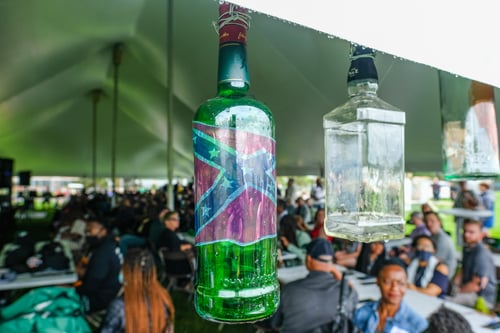
“Haingin’ Haints” art installation by Lillian Young, Family and Education Fellow at the Broad Art Museum. Photo by Derrick L. Turner.
Haingin’ Haints addresses the issue that despite the progress that has been made since emancipation, there are still many factors of racism that continue to haunt the Black community today. In the South, "haint" is a term used by Black communities to describe the evil spirits. These spirits are known for causing mischief and drain the life force from their victims. One of the many ways to get rid of haints is to trap them in a bottle tree. Traditionally, bottles are hung from the branches of a Crepe Myrtle tree, and at night haints are drawn to the reflection of the moon off the glass. Once the haint enters the bottle they are trapped inside till sunrise, where they are then destroyed by the rising sun. Legend states that the displeased moans of the haints can be heard in the wind as it blows through the bottle tree.
The institutional recognition of Juneteenth has been decades in the making both at MSU and nationally. This day marked the cumulative celebration of these efforts at the MSU Juneteenth Celebration.
"We owe our gratitude to Opal Lee of Fort Worth, Texas, the grandmother of Juneteenth and her tireless efforts to make Juneteenth a federal holiday,” said social science alumna Felicia Wasson.
“We gather today as an MSU community for the very first time to acknowledge the pain of slavery and the delay of the benefit of the promise of America's constitution for all of our citizens.”
An emergent theme of the celebration was the poignant message that freedom has been delayed. In the moments leading up to the Civil Rights Act of 1964, the Black and African American community grew weary and wary of being told to wait for change.
Wasson continued, “There are pieces of legislation pending right now in our Congress. The George Floyd Justice in Policing Act is pending. The Emmett Till Antilynching Act is pending. The renewal of the Voting Rights Act is pending.... In the Michigan legislature this week, they passed three bills that continue to erode voter access in this state.”
Lee N. June, MSU professor in the College of Social Science, said, “Hopefully remembering Juneteenth will prick our conscience and move us in a direction in doing something substantial.”
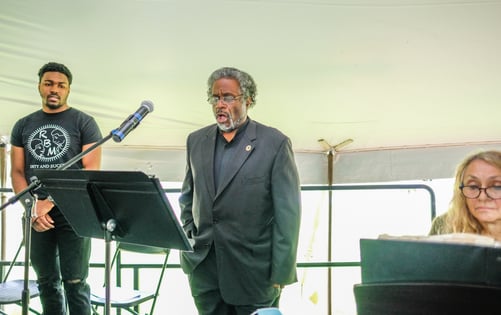
Mark and Sadie Rucker from the College of Music performing the Black National Anthem “Lift Every Voice and Sing.” Co-host Dantevius Branigan on left. Photo by Derrick L. Turner.
A number of key leaders from the institution and local community were also present, including additional MSU Board of Trustee members and executive officers, such as recently appointed Vice President of Public Safety and Chief of Police Marlon Lynch.
“These issues are very personal to me. I love MSU. I’m a product of what MSU can do. Also, I’m a Black man. I know firsthand the impact of racial profiling, police brutality on our underrepresented communities. The concept and reality of policing are viewed differently through racial and cultural lenses,” said Lynch.
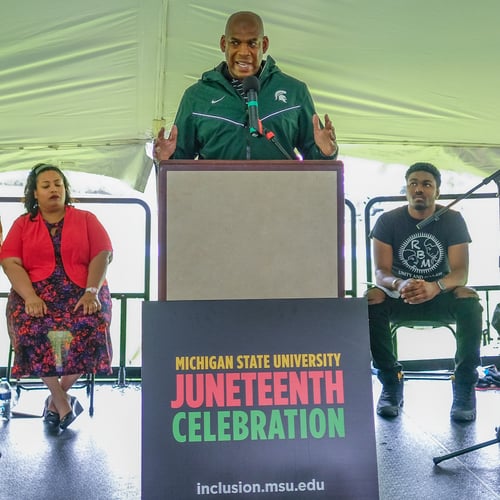
Photo of MSU Head Football Coach Mel Tucker speaking at a podium at the MSU Juneteenth Celebration with Nakia D. Parker on the left and Dantevius Branigan on the right. Photo by Derrick L. Turner.
Head Football Coach Mel Tucker who was also present said, “[Juneteenth] is an opportunity for me to reflect on what I am doing as a Black head coach.... Educating our players and our staff about African American history in this country [should occur] on an ongoing basis.”
Current President of the Black Students’ Alliance, Kenneth Franklin said, “Going forward we expect President Stanley, the Board of Trustees and employees at the university of every level to show support for diversity, equity and inclusion.”
MSU Juneteenth Celebration provided an opportunity for learning about American history and shared humanity, and it left an impression on many attendees including Teresa Mastin, professor and chairperson of the Department of Advertising and Public Relations.
“I found the inaugural MSU Juneteenth commemoration to be equally educational for all, embracing of all as a function of humanity and issuing an invitation to all to work collectively for long-term, meaningful change that benefits all,” Mastin said.
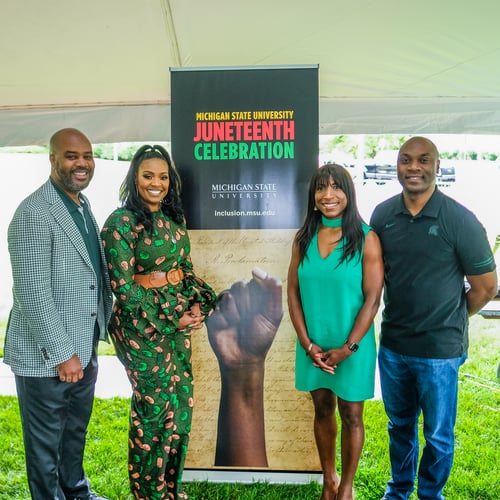
Group photo Marlon Lynch, Rema Vassar, Brianna Scott, Jabbar R. Bennett. Photo by Derrick L. Turner.
Seren Delaney, a rising sixth-grader in Okemos, shared her main takeaway from the event. “What I will remember most from this event is what Dr. Vassar said. You have to show up, which means be active. Be part of the movement,” Delaney said.
Perhaps most of all, to paraphrase Vassar, this historic commemoration of Juneteenth was a celebration of Black beauty, boldness and brilliance.
“Black people know how traumatic it is to be a Black person.... It’s hard, it’s very hard, but it’s very rewarding and I wouldn’t change who I am,” said Reed-Davis.